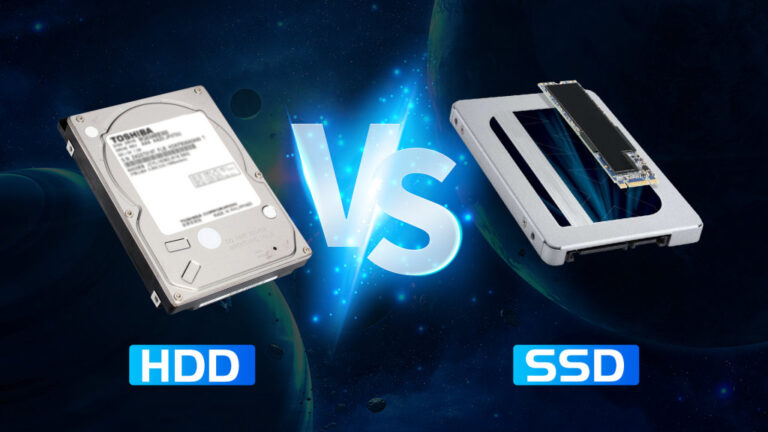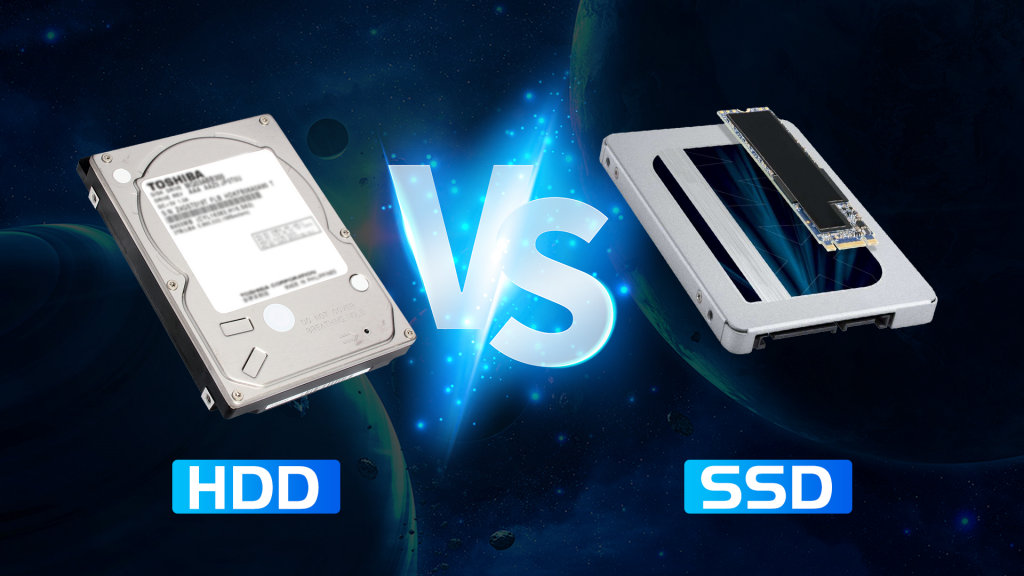
Here’s a side-by-side look at the strengths and weaknesses of both storage types:

Here’s a side-by-side look at the strengths and weaknesses of both storage types:
HDD – Pros:
- Affordable: Much cheaper per gigabyte, making it ideal for storing large amounts of data.
- High Capacity: Easily available in larger sizes (up to 16TB or more).
- Widely Available: Commonly found in desktops, DVRs, and external backup devices.
HDD – Cons:
- Slower Performance: Boot times, file transfers, and software loading are significantly slower.
- Less Durable: Susceptible to damage from drops or shocks due to mechanical parts.
- Noisy Operation: The spinning disk and moving arm can create noise.
SSD – Pros:
- Lightning-Fast Speed: Boots your system in seconds and launches apps almost instantly.
- More Durable: No moving parts means it can handle bumps and drops better.
- Energy Efficient: Uses less power, which is great for laptops and portable devices.
- Silent Operation: Completely quiet during use.
SSD – Cons:
- Higher Cost: Especially when you compare price-per-GB with HDDs.
- Limited Write Cycles: Although this has improved, SSDs still have a finite lifespan.
Where Do HDDs Still Make Sense in 2025?
While SSDs are grabbing the spotlight, HDDs haven’t disappeared — and they still serve a useful purpose in certain situations.
Ideal Use Cases for HDDs:
- Mass Data Storage: If you’re storing movies, backups, or years’ worth of photos, HDDs offer more space for less money.
- Budget Builds: For entry-level PCs, HDDs help keep overall costs low.
- Archive Systems: Perfect for data you don’t access often but want to keep safely stored.
In short, if speed isn’t your top priority, HDDs are still a very practical and economical choice.
Why SSDs Are Becoming the New Normal
By 2025, the prices of SSDs have become far more reasonable than they were just a few years ago. And with laptops, gaming consoles, and even phones using SSD-type storage, they’re quickly becoming the standard.
Ideal Use Cases for SSDs:
- Operating Systems: Installing Windows or macOS on an SSD results in a massive speed upgrade.
- Gaming: Game load times are cut dramatically, and performance is smoother.
- Creative Work: Video editors and graphic designers benefit from faster file access and transfer speeds.
- Everyday Use: Even basic web browsing and app launching feel more responsive.
Which Should You Choose?
The decision really depends on your specific needs and how you use your computer.
Go for an HDD if:
- You need tons of storage without breaking the bank.
- You’re using it for backup purposes or to archive large files.
- Speed isn’t a top concern.
Go for an SSD if:
- You want a faster, more responsive experience.
- You’re using your PC for work, gaming, or content creation.
- Portability and durability matter (especially for laptops).
Many people also choose a hybrid setup — using a smaller SSD for the operating system and key programs, and an HDD for storing large files. This gives you the best of both worlds.
Conclusion
In 2025, the gap between HDD and SSD has narrowed — not just in performance but in price as well. SSDs are now more affordable and accessible, making them the go-to choice for most users. However, HDDs still hold their ground when it comes to massive storage needs and budget-friendly builds.HDD – Pros:
- Affordable: Much cheaper per gigabyte, making it ideal for storing large amounts of data.
- High Capacity: Easily available in larger sizes (up to 16TB or more).
- Widely Available: Commonly found in desktops, DVRs, and external backup devices.
HDD – Cons:
- Slower Performance: Boot times, file transfers, and software loading are significantly slower.
- Less Durable: Susceptible to damage from drops or shocks due to mechanical parts.
- Noisy Operation: The spinning disk and moving arm can create noise.
SSD – Pros:
- Lightning-Fast Speed: Boots your system in seconds and launches apps almost instantly.
- More Durable: No moving parts means it can handle bumps and drops better.
- Energy Efficient: Uses less power, which is great for laptops and portable devices.
- Silent Operation: Completely quiet during use.
SSD – Cons:
- Higher Cost: Especially when you compare price-per-GB with HDDs.
- Limited Write Cycles: Although this has improved, SSDs still have a finite lifespan.
Where Do HDDs Still Make Sense in 2025?
While SSDs are grabbing the spotlight, HDDs haven’t disappeared — and they still serve a useful purpose in certain situations.
Ideal Use Cases for HDDs:
- Mass Data Storage: If you’re storing movies, backups, or years’ worth of photos, HDDs offer more space for less money.
- Budget Builds: For entry-level PCs, HDDs help keep overall costs low.
- Archive Systems: Perfect for data you don’t access often but want to keep safely stored.
In short, if speed isn’t your top priority, HDDs are still a very practical and economical choice.
Why SSDs Are Becoming the New Normal
By 2025, the prices of SSDs have become far more reasonable than they were just a few years ago. And with laptops, gaming consoles, and even phones using SSD-type storage, they’re quickly becoming the standard.
Ideal Use Cases for SSDs:
- Operating Systems: Installing Windows or macOS on an SSD results in a massive speed upgrade.
- Gaming: Game load times are cut dramatically, and performance is smoother.
- Creative Work: Video editors and graphic designers benefit from faster file access and transfer speeds.
- Everyday Use: Even basic web browsing and app launching feel more responsive.
Which Should You Choose?
The decision really depends on your specific needs and how you use your computer.
Go for an HDD if:
- You need tons of storage without breaking the bank.
- You’re using it for backup purposes or to archive large files.
- Speed isn’t a top concern.
Go for an SSD if:
- You want a faster, more responsive experience.
- You’re using your PC for work, gaming, or content creation.
- Portability and durability matter (especially for laptops).
Many people also choose a hybrid setup — using a smaller SSD for the operating system and key programs, and an HDD for storing large files. This gives you the best of both worlds.
Conclusion
In 2025, the gap between HDD and SSD has narrowed — not just in performance but in price as well. SSDs are now more affordable and accessible, making them the go-to choice for most users. However, HDDs still hold their ground when it comes to massive storage needs and budget-friendly builds.
Related News
See our Latest News


